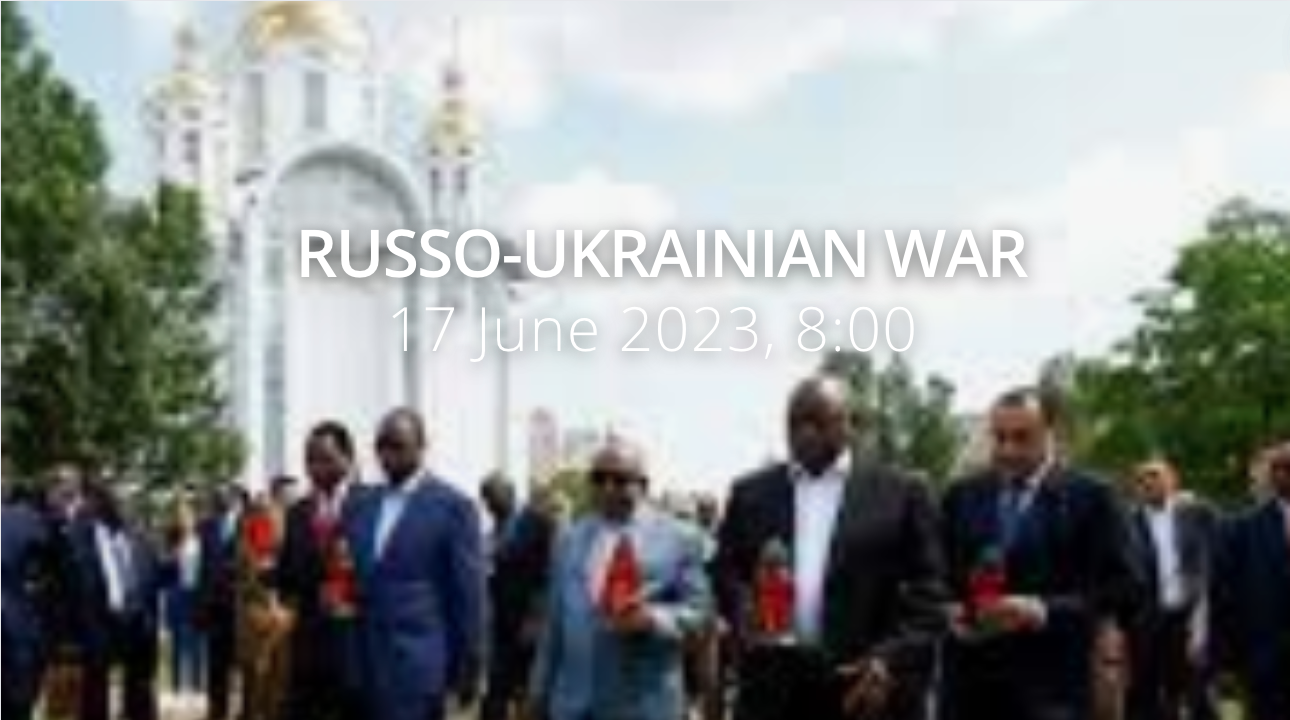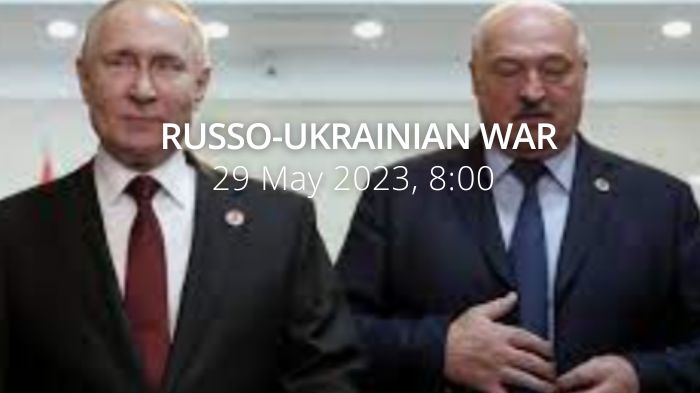Odesa to take down monument to Russian empress. A blast at Ukraine’s embassy in Madrid injures one employee. The surrender hotline for Russian soldiers in Ukraine gets up to 100 inquiries a day. Russia implements the concept of a Strategic Operation for the Destruction of Critically Important Targets (SODCIT).
Daily overview — Summary report, November 30
A map of the approximate situation on the ground in Ukraine as of 00:00 UTC 01/12/22.
There have been no notable changes to control since the last update. pic.twitter.com/W0Dj7IIz17
— War Mapper (@War_Mapper) December 1, 2022
The General Staff’s operational update regarding the Russian invasion as of 06.00 am, November 30, 2022 is in the dropdown menu below:
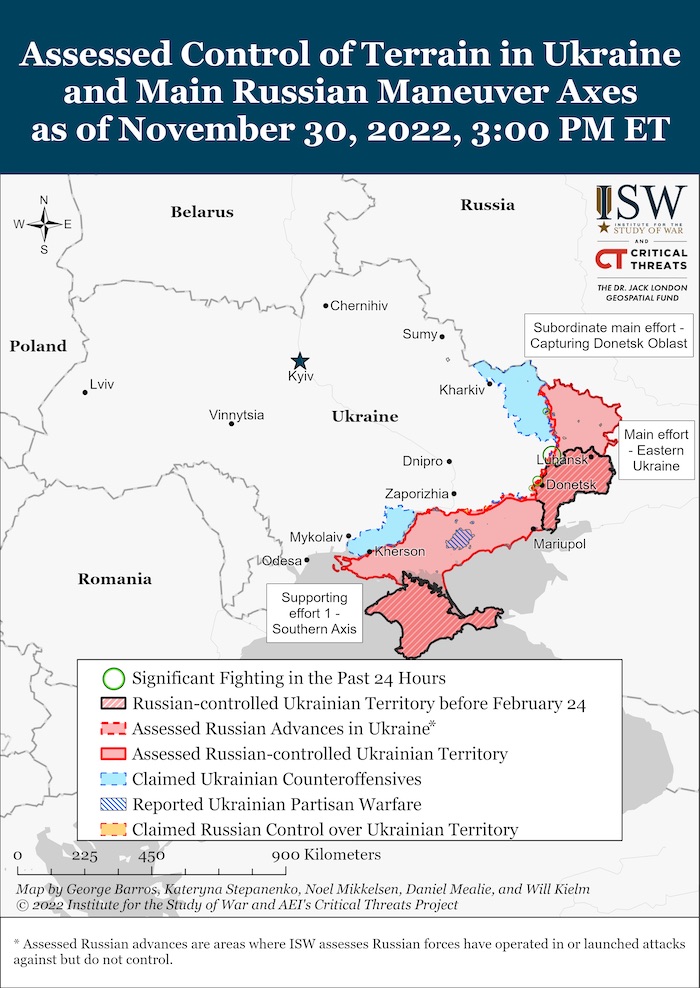
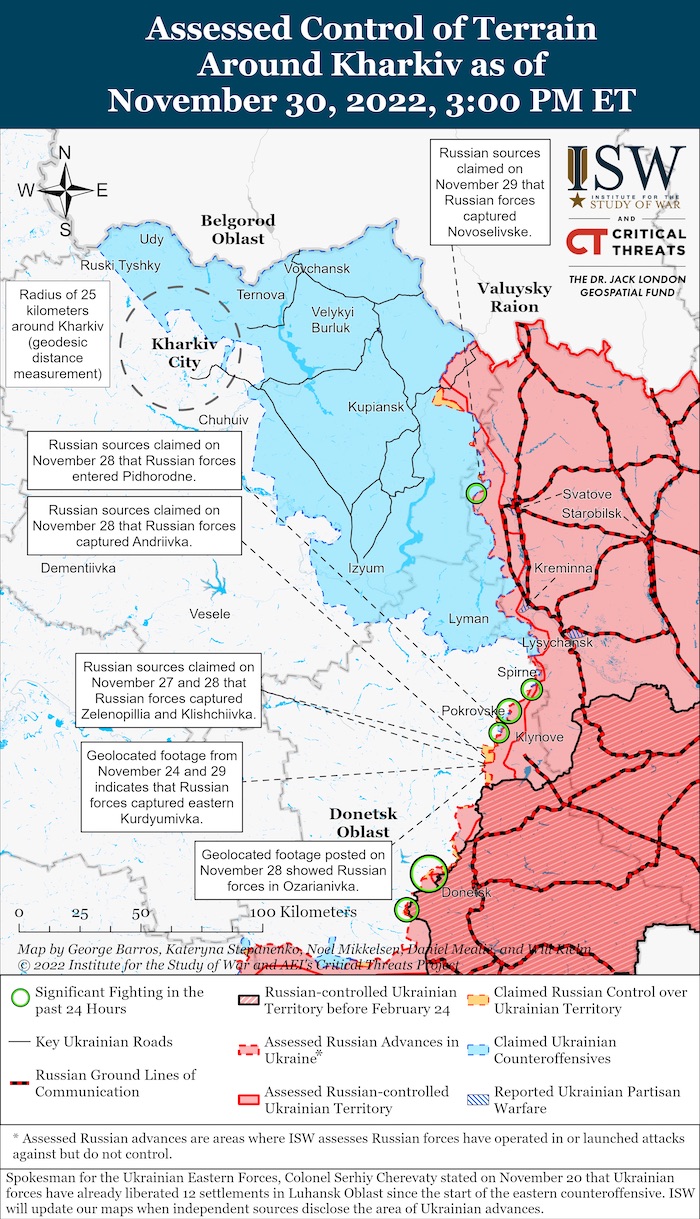
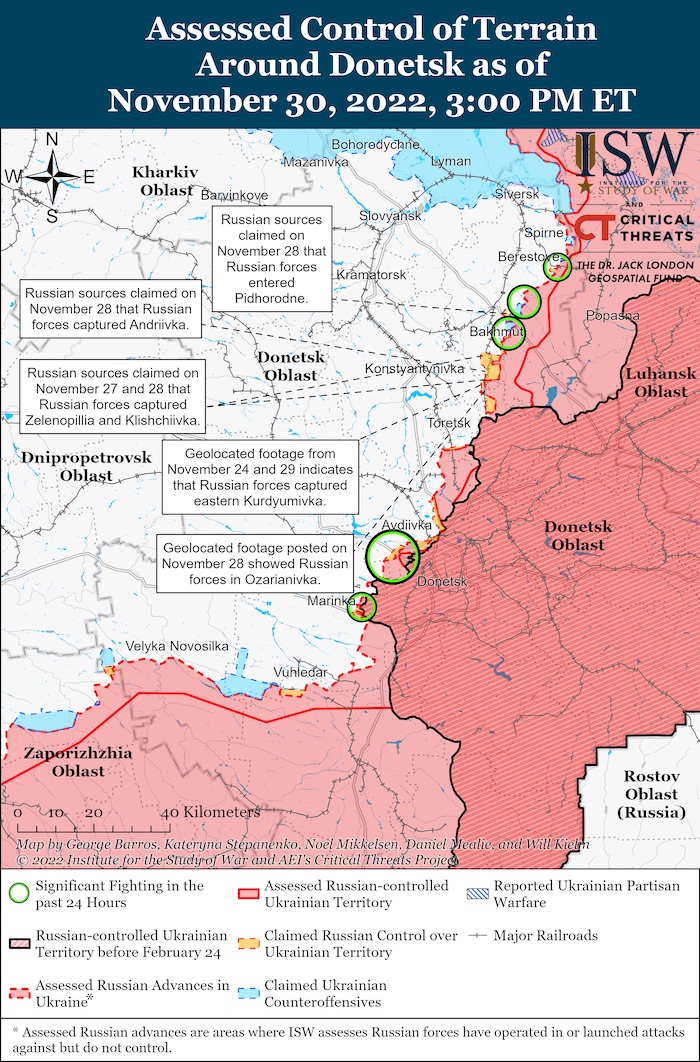
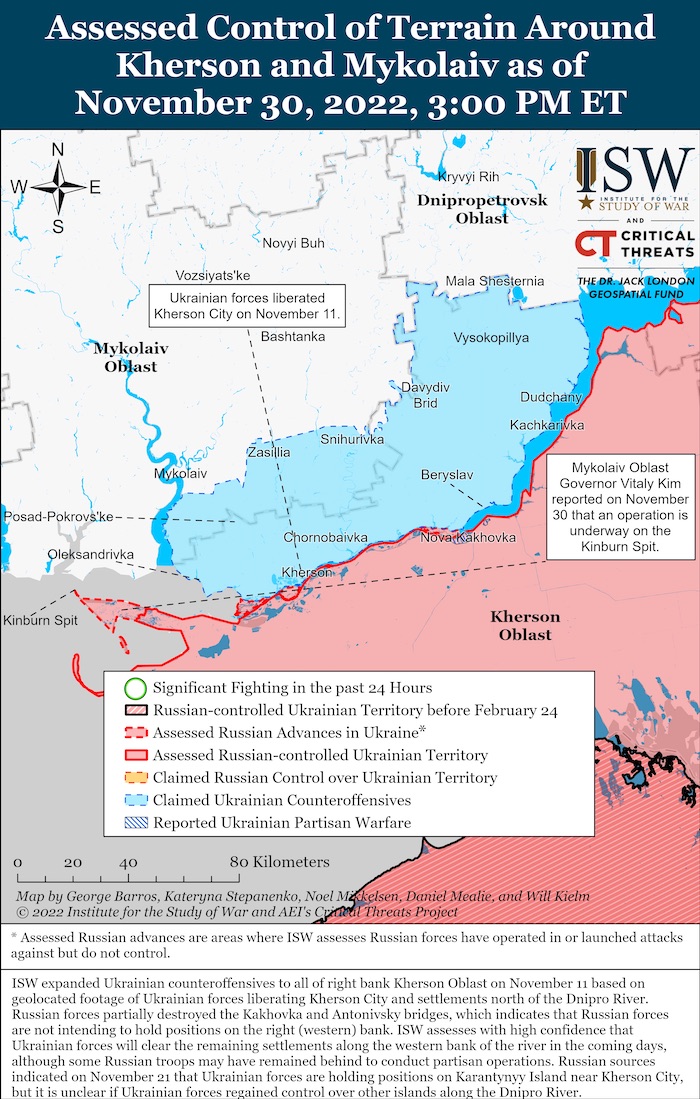
Military Updates
According to British Defence Intelligence, (last 48 hours):
- Since October 2022, Russia has repeatedly attacked Ukraine’s electricity distribution grid, primarily with cruise missiles. This is likely the first example of Russia attempting to implement the concept of a Strategic Operation for the Destruction of Critically Important Targets (SODCIT), a key component of the military doctrine it has adopted in recent years.
- Russia envisioned SODCIT as using long-range missiles to strike an enemy state’s critical national infrastructure, rather than its military forces, to demoralise the population and ultimately force the state’s leaders to capitulate.
- Russia’s strikes continue to cause power shortages resulting in indiscriminate, widespread humanitarian suffering across Ukraine. However, its effectiveness as a strategy has likely been blunted because Russia has already expended a large proportion of its suitable missiles against tactical targets. Also, with Ukraine having successfully mobilised for nine months, material and psychological effect of the SODCIT is likely less than if it was deployed in the initial period of a war.
Losses of the Russian army
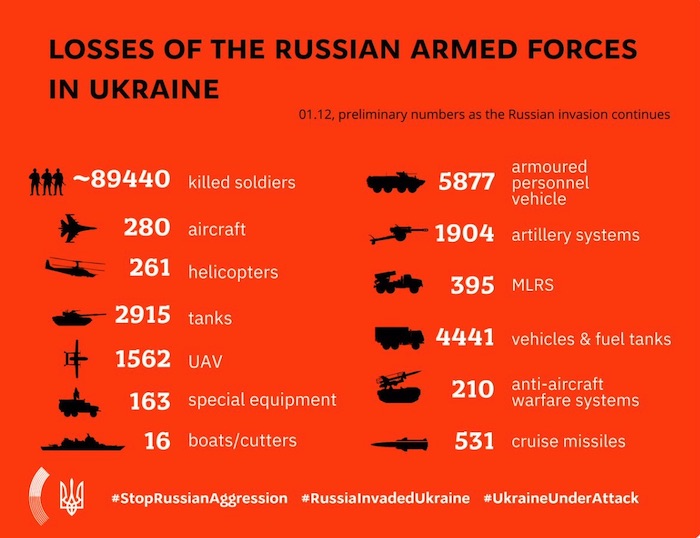
Humanitarian
Bundestag, the German Parliament, has voted on November 30 for a resolution that recognizes the Holodomor genocide of Ukrainians. The text of the resolution says that the great famine of 1932-33, known in Ukraine as Holodomor (translated from Ukrainian into English as “death by starvation”), should be considered “a crime against humanity” committed by the Soviet Union under the rule of Josef Stalin. Read more here.
22 countries now recognize Holodomor as genocide:
Australia
Brazil
Canada
Colombia
Czech Republic
Ecuador
Estonia
Georgia
Germany
Hungary
Ireland
Latvia
Lithuania
Mexico
Moldova
Paraguay
Peru
Poland
Portugal
Romania
Ukraine
USA
Vatican Cityhttps://t.co/NTpRjiLSxn pic.twitter.com/wePLwDUU3D— Euromaidan Press (@EuromaidanPress) November 30, 2022
️Environment
Power was down in Kherson City due to massive Russian shelling in the morning, according to Oblast Head Yanushevych Yanushevych. More explosions reported in the liberated city.
Legal
Russia sentences Crimean Solidarity activist to 17 years for defending political prisoners. A Russian court has sentenced Marlen Mustafayev to 17 years imprisonment on preposterous charges copy-pasted from another political trial initiated over three years ago. Read more here.
#Russia sentences #CrimeanSolidarity activist to 17 years for defending #CrimeanTatar, other #Ukraine political prisoners #LetMyPeopleGo #StandWithUkraine #StopRussia #FreeMarlenMustafayev https://t.co/OYljtTcyRW pic.twitter.com/0uqWu43Rtp
— Halya Coynash (@halyapuff) November 30, 2022
Support
NATO Chief: Ukraine will one day join Western military alliance. “NATO’s door is open,” Stoltenberg told NATO FMs on Nov 29 adding that “Russia does not have a veto” on countries joining. However, he did say that Ukraine’s victory must come first. As well, NATO countries will continue to strengthen political and practical support to Ukraine, which continues to defend its sovereignty and territorial integrity from Russian aggression, NATO ministers said in a statement following the 29-30 November ministerial meeting of the Alliance in Bucharest. At this meeting, NATO countries made additional contributions to the Comprehensive Assistance Package for Ukraine to provide urgent assistance to restore the energy system. They also reaffirmed that the door to NATO membership is open to Ukraine but provided no concrete plan for this to happen.
Substantive discussion underway on SAM Patriot supplies to Ukraine – Foreign Minister of Ukraine Kuleba. Earlier, no one but Ukraine would talk about the possibility of supplying the MIM-104 Patriot surface-to-air missile systems to Ukraine, but now a “very serious and substantive discussion” is taking place. More here.
NATO is looking to invest in Soviet-era weapon systems used in Ukraine – US State Sec Blinken. NYT mentioned there are discussions about NATO investing in old factories in Czechia, Slovakia, Bulgaria to restart the production of Soviet-caliber shells.
NATO is looking to invest in Soviet-era weapon systems used in Ukraine – US State Sec Blinken
NYT mentioned there are discussions about NATO investing in old factories in Czechia, Slovakia, Bulgaria to restart the production of Soviet-caliber shells https://t.co/ccvgkZj84B
— Euromaidan Press (@EuromaidanPress) November 30, 2022
EU seeks tribunal for Russian war crimes in Ukraine, proposes plan for confiscating frozen Russian assets. With the support of the UN, the EU proposes to create a specialized court to investigate and prosecute the crime of Russian aggression, European Commission President Ursula von der Leyen said on 30 November. As well, the EU proposes confiscating Russian assets that have been frozen to punish Moscow for invading Ukraine, exploring legal options with EU partners to compensate Kyiv for damage from Russian aggression.
New Developments
Odesa council votes to take down monument to Russian Empress
Over 50% of Russians support peaceful talks with Ukraine – Meduza
Blast at Ukraine’s embassy in Madrid injures one employee, according to Reuters. A package addressed to the Ambassador of Ukraine in Spain exploded earlier today injuring a security officer at Ukraine’s embassy in Madrid. The Spanish Minister of Foreign Affairs, Jose Manuel Albares, has already had a phone conversation with the Ukrainian ambassador and expressed his support. Euromaidan Press.
European Commission recommended that €13 billion in EU funds for Hungary be frozen because Budapest falling short on its commitments to meet EU standards on the rule of law – AFP.
European Commission recommended on Nov 30 that €13 bln in EU funds for Hungary be frozen because Budapest falling short on its commitments to meet EU standards on the rule of law – AFPhttps://t.co/2Ta1v41HAL
— Euromaidan Press (@EuromaidanPress) December 1, 2022
Zelenskyy invites Elon Musk to come see what Russia has done in Ukraine responding to Musk’s “peace deal” proposals. Read more here.
Assessment
- On the war.
The Institute for the Study of War has made the following assessment as of November 30, 2022:
Russian efforts around Bakhmut indicate that Russian forces have fundamentally failed to learn from previous high-casualty campaigns concentrated on objectives of limited operational or strategic significance. Russian forces have continually expended combat strength on small settlements around Bakhmut since the end of May; in the following six months, they have only secured gains on the order of a few kilometers at a time.[1] As ISW has previously observed, Russian efforts to advance on Bakhmut have resulted in the continued attrition of Russian manpower and equipment, pinning troops on relatively insignificant settlements for weeks and months at a time.[2] This pattern of operations closely resembles the previous Russian effort to take Sievierodonetsk and Lysychansk earlier in the war. As ISW assessed throughout June and July of this year, Ukrainian forces essentially allowed Russian troops to concentrate efforts on Sievierodonetsk and Lysychansk, two cities near the Luhansk Oblast border of limited operational and strategic significance, in order to capitalize on the continued degradation of Russian manpower and equipment over the course of months of grinding combat.[3] Russian troops eventually captured Lysychansk and Sievierodonetsk and reached the Luhansk Oblast border, but that tactical success translated to negligible operational benefit as the Russian offensive in the east then culminated. Russian efforts in this area have remained largely stalled along the lines that they reached in early July. Even if Russian troops continue to advance toward and within Bakhmut, and even if they force a controlled Ukrainian withdrawal from the city (as was the case in Lysychansk), Bakhmut itself offers them little operational benefit. The costs associated with six months of brutal, grinding, and attrition-based combat around Bakhmut far outweigh any operational advantage that the Russians can obtain from taking Bakhmut. Russian offensives around Bakhmut, on the other hand, are consuming a significant proportion of Russia’s available combat power, potentially facilitating continued Ukrainian counteroffensives elsewhere.
Russian state nuclear power company Rosatom stated that the former chief engineer of the Zaporizhzhia Nuclear Power Plant (ZNPP) has become the new director of the ZNPP. Rosatom advisor Renat Karchaa announced on November 30 that Yuriy Chernichuk has become the new ZNPP director and the first deputy general director of the Joint Stock Company “Operating Organization of the ZNPP,” which is the entity that Rosatom formed on October 3 to essentially replace Ukrainian company Energoatom as the plant’s operator and to oversee the “safe operation” of the ZNPP and manage personnel activities within the plant.[4] Karchaa also noted that the entire management company of the ZNPP is formed of existing members of ZNPP staff who have signed a new employment contract.[5] Rosatom‘s direct role in appointing and overseeing ZNPP management is consistent with previous efforts to install and maintain Russian control of the ZNPP in a way that is likely intended to force the International Atomic Energy Agency (IAEA) to de facto accept Russian claims over the plant by interacting with Russian-controlled ZNPP staff.[6]
The Kremlin continues efforts to stifle domestic dissent through legislation that broadens the definition of “foreign agents” and those amenable to foreign influence. Russian media began reporting on November 23 that the Russian government approved new restrictions on the ability of those deemed “foreign agents” to post materials created by foreign-influenced sources and conduct public activities, which will enter into effect on December 1.[7] The Russian Ministry of Justice expanded the list of “individual-foreign agents” on November 27 on the basis of those individuals conducting unspecified political activities.[8] The United Kingdom Ministry of Defense (UK MoD) also noted that Russian President Vladimir Putin has approved amendments to the 2012 ”Foreign Agents Law” that extends the original definition of ”foreign agents” to anyone who is under undefined ”influence or pressure” from foreign actors.[9] The amendments also afford the Russian Ministry of Justice the purview to publish the personal details of designated foreign agents, opening them up to public harassment.[10] These measures are likely intended to crack down on increasing instances of domestic dissent about the Kremlin’s conduct of the war. By broadening the definition of those classified as foreign agents, the Kremlin can expand its weaponization of this designation to ratchet up censorship measures and exert increased control over the information space.
The Belarusian Minister of Defense made comments likely in support of ongoing information operations, and some Russian sources reframed those comments so as to place further pressure on Belarusian officials to support Russia’s war in Ukraine. Belarusian Minister of Defense Lieutenant General Viktor Khrenin stated on November 30 that the actions of bordering NATO members suggest that preparations are underway to conduct military operations in the eastern direction (i.e., against Belarus).[11] While Khrenin’s comments incorporate several possible types of military operations, Russian media and a milblogger reported his comments as saying explicitly that NATO is preparing for offensive operations in the eastern direction (which is a nonsensical accusation).[12] Khrenin likely made the comments about NATO military activities on the borders with Belarus in support of what ISW has previously assessed is an ongoing information operation aimed at fixing Ukrainian forces on the border with Belarus in response to the threat of Belarus entering the war.[13] ISW has also previously assessed that Belarus is highly unlikely to enter the war.[14] Russian sources likely framed Khrenin’s comments to be more inflammatory in order to support the information operation about Belarus entering the war but also to set more escalatory information conditions that may place more pressure on Belarusian officials to further support the Russian offensive campaign in Ukraine.
Russian opinion polling suggests that the Russian public may be tiring of Russia’s war in Ukraine. Russian opposition media outlet Meduza reported on November 30 that it had gained access to the results of an opinion poll commissioned by the Kremlin for internal use that shows that 55 percent of Russians favor peace talks with Ukraine and 25 percent favor continuing the war.[15] Russian independent polling organization Levada’s October polling shows a similar breakdown with 34 percent favoring continuing military actions in Ukraine and 57 percent favoring negotiations.[16] Internal Kremlin polling reportedly placed the percentage of Russians supporting negotiations with Ukraine at 32 percent in July and the percentage favoring the continuation of the war at 57 percent.[17] Meduza reported that the director of the Levada Center Denis Volkov stated that the share of Russians likely to support peace talks with Ukraine began to grow rapidly following Russian President Vladimir Putin’s partial mobilization decree.[18] Disruptions associated with partial mobilization and Russian setbacks on the battlefield have likely contributed to an increasing war weariness among the Russian public, as reflected in the polling.
Key Takeaways
- The Russian military’s efforts around Bakhmut suggest that Russian forces failed to learn from previous costly campaigns focused on operationally insignificant settlements.
- Russian state nuclear company Rosenergoatom appointed a new director for the Zaporizhzhia Nuclear Power Plant.
- The Kremlin continues efforts to stifle domestic dissent through an expansion of measures ostensibly aimed against “foreign agents.”
- Russian opinion polling suggests that the Russian public may be growing tired of Russia’s war in Ukraine.
- Russian forces continued efforts to defend against Ukrainian counteroffensive operations along the Svatove-Kreminna line.
- Russia forces continued to make incremental gains around Bakhmut and to conduct offensive operations in the Avdiivka-Donetsk City area.
- A Ukrainian official acknowledged that Ukrainian forces are conducting an operation on the Kinburn Spit.
- Russian and Ukrainian sources indicated that Russian officials are continuing to conduct partial mobilization measures.
- Russian officials’ ongoing efforts to integrate illegally annexed territories into the Russian Federation are likely very disorganized.
Ukraine’s attack on Sevastopol on 29 October 2022 will go down in history as the first major example of what many believe is a new era of drone warfare.https://t.co/MWZNyHUcNW
— Euromaidan Press (@EuromaidanPress) December 1, 2022







